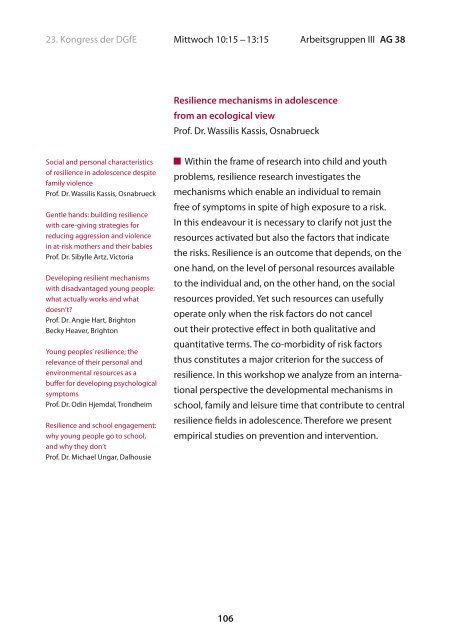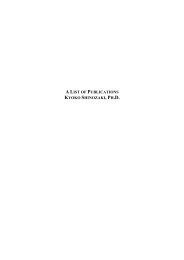Programm - Transnationale Soziale Unterstützung
Programm - Transnationale Soziale Unterstützung
Programm - Transnationale Soziale Unterstützung
Sie wollen auch ein ePaper? Erhöhen Sie die Reichweite Ihrer Titel.
YUMPU macht aus Druck-PDFs automatisch weboptimierte ePaper, die Google liebt.
23. Kongress der DGfE Mittwoch 10:15 – 13:15 Arbeitsgruppen III AG 38 23. Kongress der DGfE Mittwoch 10:15 – 13:15 Arbeitsgruppen III AG 39<br />
Resilience mechanisms in adolescence<br />
from an ecological view<br />
Prof. Dr. Wassilis Kassis, Osnabrueck<br />
Kooperation als organisationaler Grenzgang<br />
Prof. Dr. Wolfgang Seitter, Marburg<br />
Dr. Timm C. Feld, Marburg und Bonn<br />
Social and personal characteristics<br />
of resilience in adolescence despite<br />
family violence<br />
Prof. Dr. Wassilis Kassis, Osnabrueck<br />
Gentle hands: building resilience<br />
with care-giving strategies for<br />
reducing aggression and violence<br />
in at-risk mothers and their babies<br />
Prof. Dr. Sibylle Artz, Victoria<br />
Developing resilient mechanisms<br />
with disadvantaged young people:<br />
what actually works and what<br />
doesn‘t<br />
Prof. Dr. Angie Hart, Brighton<br />
Becky Heaver, Brighton<br />
Young peoples’ resilience; the<br />
relevance of their personal and<br />
environmental resources as a<br />
buffer for developing psychological<br />
symptoms<br />
Prof. Dr. Odin Hjemdal, Trondheim<br />
Resilience and school engagement:<br />
why young people go to school,<br />
and why they don‘t<br />
Prof. Dr. Michael Ungar, Dalhousie<br />
Within the frame of research into child and youth<br />
problems, resilience research investigates the<br />
mechanisms which enable an individual to remain<br />
free of symptoms in spite of high exposure to a risk.<br />
In this endeavour it is necessary to clarify not just the<br />
resources activated but also the factors that indicate<br />
the risks. Resilience is an outcome that depends, on the<br />
one hand, on the level of personal resources available<br />
to the individual and, on the other hand, on the social<br />
resources provided. Yet such resources can usefully<br />
operate only when the risk factors do not cancel<br />
out their protective effect in both qualitative and<br />
quantitative terms. The co-morbidity of risk factors<br />
thus constitutes a major criterion for the success of<br />
resilience. In this workshop we analyze from an international<br />
perspective the developmental mechanisms in<br />
school, family and leisure time that contribute to central<br />
resilience fields in adolescence. Therefore we present<br />
empirical studies on prevention and intervention.<br />
Arbeitsgruppenmoderation<br />
und Kurzinput: Kooperation als<br />
organisationaler Grenzgang<br />
Prof. Dr. Wolfgang Seitter, Marburg<br />
Vernetzung im Weiterbildungsbereich:<br />
Organisationale Handlungs-<br />
und Integrationsstrategien<br />
im Rahmen von netzwerkbezogenem<br />
Change Management<br />
Dr. Timm C. Feld, Marburg und Bonn<br />
Kooperation unter einem Dach:<br />
Bildungs- und Kulturzentren als<br />
Ort systemischer und organisationskultureller<br />
Grenzbearbeitung<br />
Dipl.-Päd. Regine Mickler, Marburg<br />
Grenzüberschreitung durch Kooperation!<br />
Neo-Institutionalismus als<br />
Theorieangebot für das Verhältnis<br />
von (Bildungs-)Organisation und<br />
Umwelt<br />
Dipl.-Soz.wiss. Sascha Koch,<br />
Bochum<br />
Kooperative Bildungsarrangements<br />
– Anspruch und Wirklichkeit<br />
organisatorischer »Grenzgänge« in<br />
der Weiterbildung<br />
Prof. Dr. Karin Dollhausen, Bonn<br />
Die Arbeitsgruppe thematisiert u. a. anhand aktueller<br />
empirischer Forschungsergebnisse Kooperation als<br />
organisationalen Grenzgang. Dabei wird aus erwachsenenpädagogischer<br />
Perspektive nicht nur gefragt,<br />
welche inhaltlichen, strukturellen und strategischen<br />
Beeinflussungen durch Kooperationen bei den teilnehmenden<br />
Einrichtungen entstehen, sondern es<br />
wird auch auf Kooperationsebene betrachtet, welche<br />
unterschiedlichen professionellen und organisationalen<br />
Handlungslogiken in kooperativen Bildungsarrangements<br />
aufeinandertreffen, welche Formen der organisationskulturellen<br />
Bearbeitung relevant sind und<br />
inwiefern und unter welchen Bedingungen Kooperation<br />
als organisationaler Grenzgang zur Entwicklung<br />
professioneller pädagogischer Praxis konstituiert<br />
werden kann. Nicht zuletzt sollen (innovative)<br />
Vorgehensweisen, Techniken und entwicklungsorientierte<br />
Geschäftsmodelle der strategischen<br />
Gestaltung kooperativer Bildungsarrangements<br />
vorgestellt und diskutiert werden.<br />
Mittwoch<br />
106 107





